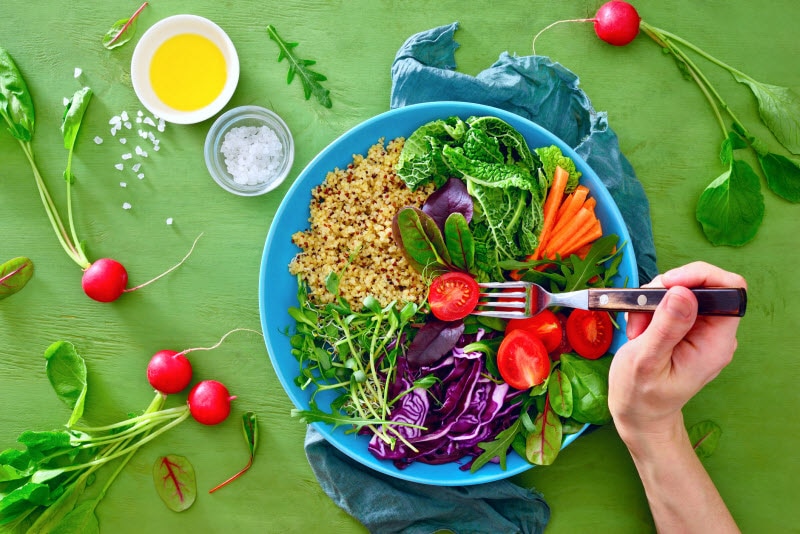In large part due to the coronavirus pandemic’s connection to meatpacking plants and meat markets, the global health crisis is driving greater interest in vegetarianism and veganism.
For instance, the League of United Latin American Citizens (LULAC), the country’s largest Latino civil rights organization, launched Meatless May Mondays to protest working conditions of employees at meatpacking plants. Coronavirus hotspots have broken out at number of meatpacking operations in the U.S.
 In a statement, LULAC President Domingo Garcia says that until the meat industry, federal agencies and state agencies “protect the lives of essential workers at all meat processing facilities in a federally mandated and verifiable manner, LULAC will call for boycotts of meat products.”
In a statement, LULAC President Domingo Garcia says that until the meat industry, federal agencies and state agencies “protect the lives of essential workers at all meat processing facilities in a federally mandated and verifiable manner, LULAC will call for boycotts of meat products.”
People for the Ethical Treatment of Animals (PETA) also has been vocal about going meatless, in light of the potential origin of the novel coronavirus at a meat, fish and vegetable market in Wuhan, China. The group stresses that tofu “never caused a pandemic.”
“With hundreds of thousands of people worldwide dead from a disease linked to slaughtering animals, the time to try tofu and other versatile vegan foods is now,” PETA President Ingrid Newkirk says in a news release.
To help people adopt vegan practices, PETA supplies free vegan “starter kits,” free mentoring services and free recipes. On May 20, PETA representatives handed out free boxes of tofu outside a grocery store in Cedar Rapids, Iowa. Iowa is among the states that have experienced coronavirus outbreaks at meatpacking plants.
PETA also continues to encourage people to embrace Meatless Mondays. The group offers a kit to help people start Meatless Mondays initiatives at work.
“From swine flu to SARS to COVID-19, it’s as clear as the gloved hand in front of your masked face that eating animals is killing us,” Newkirk says.
The United Kingdom’s Vegan Society stresses, however, that a vegan diet cannot prevent the novel coronavirus, which causes the potentially fatal COVID-19 disease. The group says no specific diet, food or supplement can shield you from the coronavirus.
“A plant-based diet doesn’t magically protect you from coronavirus, but a well-balanced vegan diet does support better immune functioning,” registered dietitian Simone Wilson tells The Philadelphia Inquirer.
Some benefits of switching to a plant-based diet
A plant-based diet also can boost energy and improve digestive health. In addition, research shows plant-based eating can:
- Help prevent and manage asthma. That’s because a plant-based diet can reduce inflammation, which can aggravate asthma, according to the Physicians Committee for Responsible Medicine
- Protect your gut. This is achieved by fostering bacteria that offer anti-inflammatory properties, according to researchers at the University Medical Center Groningen in The Netherlands.
- Potentially lower your risk for heart disease. A diet rich in fruits and vegetables can decrease the intake of sulfur amino acids. A high level of these amino acids is associated with a higher risk of heart disease, researchers at Pennsylvania State University say. Meats and other high-protein foods generally have a significant amount of sulfur amino acids.
- Can possibly prevent obesity among middle-aged and elderly people. Dutch researchers concluded that a diet chock-full of plant-based foods and largely devoid of animal-based foods might protect against obesity in those populations, even if someone doesn’t strictly adhere to a vegetarian or vegan diet.
The shift toward plant-based eating
While a plant-based diet isn’t a magic solution for any health care concern, more Americans are embracing veganism and vegetarianism. A survey by Self, a credit-building platform, found that 23 percent of Americans had ramped up the consumption of vegan and vegetarian meals due to the pandemic. Registered dietitian Shena Jaramillo explains that the rise of plant-based products stems from the shelf-stable nature of protein-packed foods like nuts, beans, rice and quinoa.
Meat shortages prompted by shutdowns or slowdowns at meatpacking plants around the U.S. also have contributed to a spike in purchases of plant-based foods. In the nine-week period ending May 2, sales of plant-based “meats” soared 264 percent, according to data from market research company Nielsen. The Plant Based Foods Association and SPINS, a provider of data and market analytics about wellness, indicate that the plant-based movement will enjoy staying power beyond the pandemic.
“Since the beginning of the pandemic, there has been a continued shift in consumer purchasing toward natural and organic products that enhance health and immunity,” Tony Olson, owner and CEO of SPINS, says in a news release.
Indeed, Bruce Friedrich, executive director of the Good Food Institute, which promotes alternative sources of protein, says plant-based eating is “reaching a clear tipping point,” as major U.S retailers strive to stock their shelves with plant-based foods.
“Traditional meat eaters and flexitarians are embracing plant-based products, which means it is critical for retailers to employ plant-based strategies that attract the mainstream consumer. Plant-based eating is no longer niche,” says Caroline Bushnell, the Good Food Institute’s associate director of corporate engagement.
